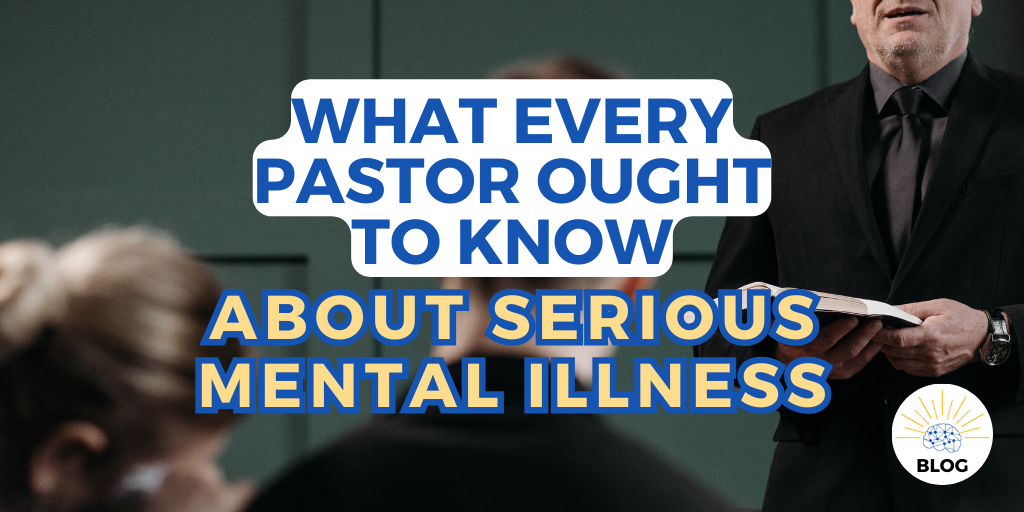Pastors and church leadership are number one on the frontlines to those who seek help for these kinds of issues with these kinds of diagnoses. It is crucial to educate the ranks of church leadership so that we can catch the “least of these” in the crises they may present and refer them to the right solutions.
There is evidence that pastors don’t feel very well equipped to handle mental illness and therefore need discernment to appropriately address these situations. I want every pastor to know what to expect, how to communicate, and what to do when they arise.
Within the wake of Covid’s circumstances, the matters of the mind have risen to a more visible level. This is good for generating awareness of general disorders and the stressors concerning situational depression and psychological or even spiritual oppression. However, it has not changed the significance nor moved the needle of treatment those with Serious Mental Illness/Serious Brain Disorders have always needed since deinstitutionalization.
First, What is Serious Mental Illness?
Serious Mental Illness (SMI) is not the same thing as mental health, and mental health conditions can be SMI, but not all of them are. The most vulnerable, most serious cases are ‘serious’ or ‘severe’ in name and nature. These need to be addressed and distinguished differently from milder mental health cases.
Schizophrenia, schizo-affective disorder, bipolar disorder, major depressive disorder and any other mood disorder with psychotic features are serious brain illnesses. The brain is at risk of actually having neurological damage done to it and regressing in cognition to the potential degree of the person not even realizing they are sick.
Anosognosia, the term for this lack of insight, makes about half of us with these diagnoses unrecognizable persons to ourselves. This condition can be debilitating and is often the main reason why so many people with SMI don’t seek treatment, are incarcerated, homeless, or dead.
Second, What can I expect from someone with SMI?
Depending on their diagnosis, different symptoms present during episodes. I’m framing these descriptions within the context of faith-based misconceptions and will then suggest medically appropriate solutions. These are descriptions of someone with an untreated condition. Those who are treated with medication and therapy are typically stable.
Depression Symptoms:
- Suicidal Thinking: yes, suicide is a sin and it’s not God’s will for us. However, it isn’t advisable to lead with those points. A person in this state of mind may not be able to rationalize. One way to look at suicide within the context of the Christian faith is that if we are a believer in Christ, our eternity is secure – BUT – Jesus surrendered His life so that we don’t have to take our own. We are to endure and actively follow Him in His word to claim the abundant, fulfilling life He offers on earth as well.
- Hopelessness: conditions of mental and brain circuity/chemistry misfiring means this person may not be able to feel hope. They can be encouraged by scripture and the truth of God’s word, but that doesn’t mean they are capable of feeling hopeful or changing their mind about their situation. The brain condition may not cause hopelessness, but it may exacerbate it.
- Stubbornness: when in a clinical depression, this person may appear like they are choosing to not listen to you, God, or anyone else vested in their best interest. This may be the depression talking when they have been encouraged, reminded, listened to, and empathized with. They simply can’t change their thought process by sheer willpower. There is a difference between stepping out in faith and trusting God and struggling through an episode or season of clinical depression.
Mania Symptoms:
- Grandiose Thinking: in mania, this state constitutes a variety of creative, superfluous, capricious, and can include outright strange and far-out thoughts. With grandiose thinking, this person doesn’t just believe God loves them and has a purpose for their life, they may think they are someone extraordinary and especially significant. They may think they are even anointed or called out in a manner of irrational and unprecedented grandeur. They could think they are exponentially capable of anything they put their mind to, and take to their beliefs to the extreme.
- Irritability: this trait shows up with the speed of our thought processes going rapid-fire, along with accelerated speech rates, and can turn into a meltdown or even physically aggressive if we’re left untreated for too long. We don’t need you to preach patience at us, or to even hold our tongue, because, quite frankly, we cannot control that! The brain in a manic state is dangerous and risky, and our behaviors will show that.
- Revved Engine of Brain Activity: as mentioned before, in mania one can feel like a superhero. The increased energies in mania can generate a long trail of behaviors from early morning into late at night. Examples range from shopping sprees, increased libido, and increased productivity. Output goes beyond normal range, to outbursts of anger and fighting. Be advised there can be symptoms even while engaged in active treatment. Mood stabilizers and other psychotropics help curtail our highs and lows, but not everyone is able to eliminate all symptoms.
Psychosis Symptoms:
- Hallucinations: things appearing to be real to that person in visual, audible, tactile or even smells while in psychosis or in schizophrenia means the person needs treatment right away. They’re likely unable to discern real from what’s not. In many cases these symptoms present as spiritual personas — whether “seen” or “heard”– and although this may be spiritual in nature, doesn’t mean the root cause is spiritual. In many cases, hallucinations can be minimized and even eliminated by the correction of brain chemistry and circuitry with the application of psychotropic medications.
- Delusions: beliefs that are not true to the extreme. Common delusions can include the government is spying on them/bugging their phone, they’re an actual person from the Bible, paranoid thinking that someone is out to get them, or that someone even a close friend or family member, is someone they’re not. It’s arbitrary trying to confront these delusions, but you can still listen to and affirm the person with the suggested phrases below.
Third, how do I handle someone with SMI?
Depending on the degree of stability, the person with SMI may or may not be able to comprehend, cooperate, or cope with your intervention. Here is what to do pastorally and medically to handle these situations:
Dealing with Someone in Depression:
Pastorally speaking, you may come alongside and pray with them if they are open to that, and always pray to intercede that their depression lift. You cannot expect someone in a clinically depressed or anxious state to “snap out of”, “trust God” in order to eliminate feelings of anxiety, or any other way you might frame it. Someone in a state of major depression is there and will be there for a while. Until they can receive medically necessary treatment and recondition their thoughts through medically necessary medications and therapies, it is not your charge to expect them to change their mind or even their heart.
Medically speaking, in all these symptoms, you may try assessing the person for how often, how serious their thoughts are, if they have a plan, method, date, and referring them to a mental health provider or emergency department for immediate treatment is your next step.
Dealing with Someone in Mania:
Pastorally speaking, it’s best to help them stay grounded by listening to and redirecting their conversation as much as possible to practical solutions – including treatment. The best thing you can do for someone is to listen to them, calmly redirect them to find treatment, and pray for them (not necessarily with them).
Medically speaking, encourage the person with SMI or someone very close to them, a trusted family member, caregiver, or friend, to get them to be seen by a mental health provider. If they need to talk to someone and don’t have any history with a provider, you can always call 988 in the states for someone to talk with them. If they are in danger or risk of harming themselves or others, try to talk them down and de-escalate the situation, and if that doesn’t work, call 911 for a crisis intervention trained person from the local police department.
Dealing with Someone in Psychosis:
Pastorally speaking, it’s best to affirm anyone in a psychotic state of mind, and not to deny their hallucinations because they “seem” real to them. Avoid using these statements: “they’re not really there,” “it’s all in your head,” “they ‘seem’ real,” or anything like that. Address how they feel. They may also be experiencing something negative, so you may reflect how that sounds to you: ie “That sounds scary/rough/hard/distressing/unkind/etc.”. Be aware that hallucinations can come to some with SMI in forms of people, demons, angels, the devil, and it is okay to ask the person what they see and to describe them and talk about them.
Always be sensitive to their perspective that it is real to them, however unreal it is to you.
Medically speaking, someone in an acute, active psychotic state needs medical attention. If they are actively being seen by a psychiatrist who prescribes meds, and are still not stable, consider suggesting to their loved ones another appointment with the psychiatrist as soon as possible. The sooner these cases are treated, the better the outcome and prognosis.
Disclaimer and Conclusion
As always, this information provided on delightindisorder.org in the content posted is never meant to diagnose, treat, or otherwise be responsible for anything you may apply and the results that happen therein. I’m sharing from personal experience and clinical background, but this is not to be taken as professional advice. Please refer to a licensed, trained mental health professional for personalized care and treatment. As always, consult a psychiatrist before taking or changing medications/doses.
Discover more from Delight in Disorder
Subscribe to get the latest posts sent to your email.







